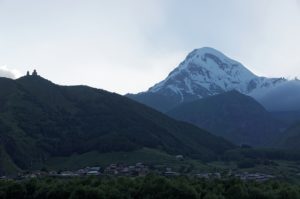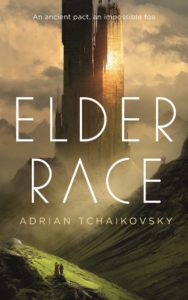Elder Race offers an extended meditation on Clarke’s Third Law, some thoughts on cultural contamination that are not new but are important to Adrian Tchaikovsky’s characters, all wrapped up in a fast-paced adventure of swords and sufficiently advanced technology. The novella is set on Sophos 4, a planet colonized by humans during the first interstellar flowering of Earth’s civilization, when generation ships were sent out into the cosmos. That effort proved unsustainable on humanity’s home planet and starfaring stopped, leaving the colonies to fend for themselves. Much later, a second wave of exploration began with the mastery of faster-than-light travel.
Nyr, the first-person narrator of half of Elder Race was part of that second wave. As he puts it, “My name is Nyr Illim Tevitch, anthropologist second class of Earth’s Explorer Corps. I am centuries old and light years from home.” (p. 25) He was part of an expedition to Sophos 4 that observed the colonists’ descendants and sought to understand their cultures and developments without letting them know that they were being observed. The inhabitants of Sophos 4 had lost all of their advanced technology, retaining only myths of an origin from across the seas of night. Some of the colonists had been modified to breathe water as well as air, and these traits had become inheritable. Nyr’s expedition aimed to understand these changes, too, and what had happened in the generations since the first arrivals. At some point in the study, Nyr’s fellow scientists were recalled to Earth, and he was left to mind the store for what they thought would be a brief hiatus. Something happened, though, and they have not returned although centuries have passed. Even communications have stopped coming. Nyr is stranded, alone with the machines that were designed to study the planet, and which support him through many decades of stasis.
His chapter is the second. Elder Race opens with third-person narration of Lynesse Fourth Daughter, youngest and unruly daughter of a queen of Lannesite, a polity that stretches from the coast to high mountains. Word has come from the forested statelets that look to Lannesite as a more powerful neighbor of a demon that ravages humans, plants and animals, raising a wave of destruction that seems unstoppable. Lynesse’s mother discounts the refugees’ tales as exaggeration, but Lynesse believes them and sees an opportunity to redeem herself from the court’s opinion that she is childish and reckless. She does this, of course, by ascending a taboo mountain to seek aid from a sorcerer who came to Lannesite’s assistance generations ago before returning to his tower that is so far and mighty that her people are forbidden from even going to anywhere that they might see it. She had caught sight of it once before, when she ran away from an observance at the highest point it was permitted for her people to go, and she had caught hell for that from her mother and from the officers of the court.
The Tower of Nyrgoth Elder, last of the ancients, was built into the mountainside. It had no sign of join or masonry. Some grand magic had just excised a great deal of the stone until all that was left was the tower, jutting from the new line of the mountainside, overhanging a chasm, reaching for the sky. The day had been crystal clear when she’d gone on her unauthorised jaunt all those seasons before, and she had good eyes. The image had stayed with her ever since. (p. 14)
She has come to knock on the sorcerer’s door and ask him to fulfill his oath to aid the people of Lannesite again, if they were ever in great need. For once, long ago, Nyr had overcome his anthropologist’s distance and helped the people defeat a warlord who had somehow gained control of some of the colonization-era technology. He rationalized that interfering to prevent the culture from being overrun by that tech was a less harmful form of contamination. He was also self-aware enough to question that rationalization. And he left a promise that became integrated with the culture as the legend of the last of the ancients, who would endure and come again to help in a time of great peril.
Lynesse has ascended to call on that venerable undertaking. She has come in the company of Esha Free Mark, one of the Coast-people who can breathe in water, and who is a sometime diplomatic courier and agent for Lynesse’s mother. Esha’s reputation has been fading, which is why she agrees to accompany Lynesse.

Kazbegi (Vyacheslav Argenberg via Creative Commons)
Tchaikovsky’s description of the path to Nyr’s tower reminded me of the High Caucasus, not far from where I lived for three years. The highlands of the range’s southern side are punctuated with towers, though none like Nyrgoth Elder’s, and the paths to the peaks look like they might keep ascending forever. They dominate and demarcate the lush Georgian lands, and they too are home to powerful myths: Prometheus was said to be chained to Kazbegi, and Jason sought the Golden Fleece in another part of the Caucasian mountains. Lynesse’s ascent is one that I could imagine attempting.
She knocks, and the machines awaken him from centuries of stasis. He is true to his word, though he does not believe in demons. In the tale that follows, the three of them — though mostly Lynesse and Nyrgoth — muddle through cultural misunderstandings that one frames as living legend and the other as trying to explain science. Tchaikovsky show people at the intersection of their individual selves and the archetypes they are trying to inhabit, or in Nyr’s case trying to resist. He wants very much to explain that there is no such thing as magic and no such thing as demons, only people who understand more of the world. Lynesse and Esha sensibly reply that he has stated exactly what a wizard is: someone who understands more than mere mortals and can command great power through that understanding. One of the best chapters is set in two columns: Nyr explaining himself in his words, and those words as Lynesse and Esha hear them with their cultural references.
[Nyr says] About fifteen hundred years ago your ancestors came to this planet from another, a place called Earth. They came in a spaceship and the journey lasted many generations. On that ship they slept and woke, had children, died, until the last generation was trained by the ship in how to start the colonisation process. They were part of a wave of colonisation from Earth, the great dream of expanding into the universe.
[Lynesse hears] Nearly four hundred Stormseasons past, the ancients brought men into this world from the otherworld, ferrying them upon a boat through the seas of night in a voyage so long that those who left one shore were dust and their children’s children had to be taught how to farm and hunt and govern by the ship’s figurehead, which spoke with many voices and told them of a hundred ships and a hundred shores. In this way they became the living dream of the ancients. (p. 111)
In time, the three encounter things that even Nyr cannot fully understand and then he truly begins to be afraid. Protecting the people of Sophos 4 will take more than just the technology that usually solves every problem for him. What can Lynesse and Esha do? What can Nyr do when tech is not enough? The satisfying ending to Elder Race answers these questions, and leaves enough unanswered so that a reader can imagine how the stories of land and people continue and make new legends.

